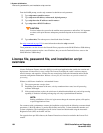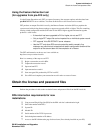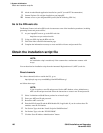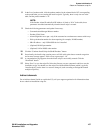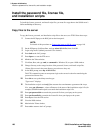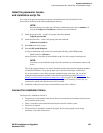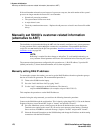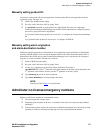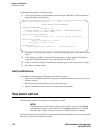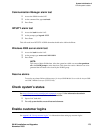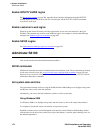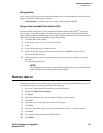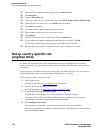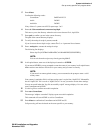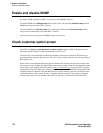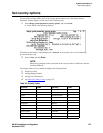
3 System initialization
Test alarm call out
172 S8100 Installation and Upgrades
November 2003
To administer these numbers, follow these steps:
1 At the SAT type change system-parameters features and press RETURN. The Feature-Related
System Parameters screen displays:
2 Go to page 4. In the Emergency Numbers – Internal field (optional) type a valid extension (up to 5
digits).
3 In the Emergency Number – External field (required) type a 21-digit, dialpad-valid character
string that can include trunk access codes. The default for this field is 911.
4 In the No-License Incoming Call Number field (optional) type a valid extension (up to 5 digits).
5 Press Enter to save the changes.
Alerts/notifications
A mismatched or missing license file generates these alarms or signals:
• Major alarm (LIC-ERR and NO-LIC) generated in the Hardware Error Log and Alarm Log (see
Alarming strategy).
• Warning message at SAT login (see Log in warning messages).
• Lights an administered feature button (see Feature button assignments).
Test alarm call out
The following procedures are to be used to test alarming on S8100.
NOTE:
If testing remotely from the Technical Service Center (TSC), you must do the rasdrop
command before doing any of the alarm tests. The rasdrop command forces a modem
disconnect after 1 minute, and gives you time to execute the alarm test commands.
After each test has been run, the Field Services Organization (FSO) technician will have to go to the ART
web site to verify each alarm has been received.
change system-parameters features Page 4 of 12
FEATURE-RELATED SYSTEM PARAMETERS
SYSTEM-WIDE PARAMETERS
Switch Name: Devo
Emergency Numbers - Internal: XXXXXX External: XXXXXXXXXXXXXXXXXXXXX
No-License Incoming Call Number: XXXXX
MALICIOUS CALL TRACE PARAMETERS
Apply MCT Warning Tone? n MCT Voice Recorder Trunk Group:
SEND ALL CALLS OPTIONS
Send All Calls Applies to: station
Auto Inspect on Send All Calls? n
UNIVERSAL CALL ID
Create Universal Call ID (UCID)? n UCID Network Node ID:



